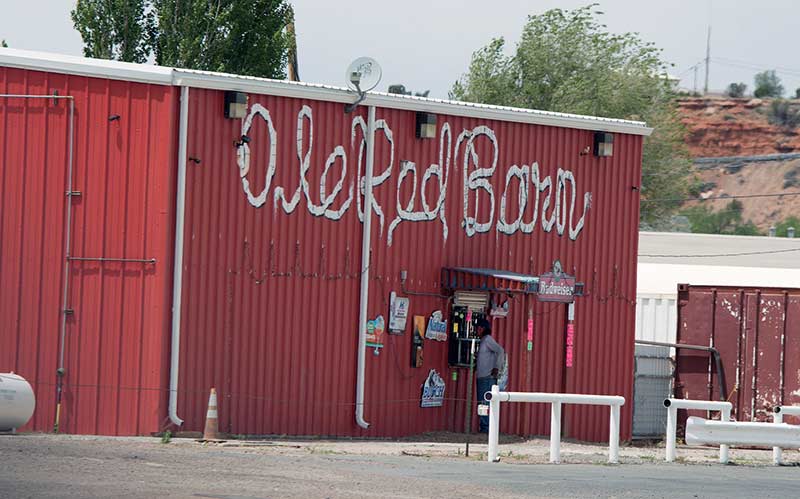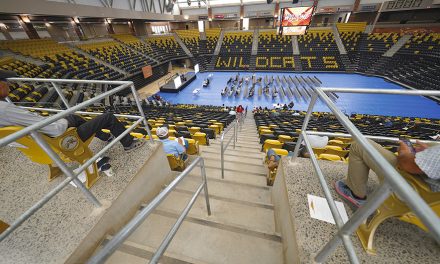
Medical transports spreading alcoholism?

A patron buys alcohol at the “walk up” store of the Old Red Barn in Sanders. (Navajo Times File Photo - Donovan Quintero)
NAHATA DZIIL, Ariz.
In the nearly four years since Nahata’ Dziil won the battle to close down the Old Red Barn liquor store and persuade the Arizona Liquor License Board to refuse the transfer of liquor licenses to the owner’s business associate, liquor is still flowing in the community.
Cross-commissioning may be the answer.
It was a long battle for the small community of Nahata’ Dziil to get clean and sober from Ole Red Barn owner Gary McDonald’s influence.
But during an August Law and Order Committee meeting, a new threat emerged.
Arizona Department of Liquor Licenses and Control detective Herb Carruthers reported that since the store shut down, liquor has been entering the community through a seemingly innocuous source: medical transport vehicles.
“There’s been talk for many years that these medical transports are relaying liquor onto the Nation,” said Carruthers, who said his department has just nine detectives for the state’s 15 counties.
“I could help with that,” he said. “I’ve expressed interest of cross-commissioning … it would help in the fact that I could help with liquor laws.”
He explained his knowledge of state liquor laws and limited knowledge of Navajo Nation liquor laws could be incorporated to train Navajo Nation Police officers, as well as allowing his agency to enforce Navajo Nation laws when needed.
“We have a cycle that needs to be broke and it starts at home,” said Carruthers. “We need to educate our youth because they are going to be tomorrow’s Council, committee members, senators and we need to break this cycle. I would rather have our youth learn the history than getting away with alcohol all the time.”
His department protects public safety and supports economic growth through the responsible sale and consumption of alcohol and to efficiently license qualified applicants.
The effort to close down Ole Red Barn Liquor and keep McDonald’s associate from taking over the liquor licenses was a tough one that was first started by the Nahata’ Dziil Hope Task Force, which recruited leaders such as former Council delegate Lorenzo Curley, the Apache County Board of Supervisors, county attorney’s office, and 22nd Navajo Nation Council, Navajo Nation Human Rights Commission, and former Navajo President Ben Shelly.
“However, we face new challenges of others importing alcohol into the communities,” said current Council Delegate Raymond Smith. “Community members express the need for law enforcement to address illegal bootlegging.”
Jesse Delmar, director of the Navajo Nation Department of Public Safety, said there would be no problem with cross-commissioning and it could use the same agreement the Nation and Arizona Department of Public Safety are currently using.
“We can sure use all the help that we can get, especially with liquor,” said Delmar. “It’s a big illegal industry in the Navajo Nation.”
So what happened to the liquor licenses after they were not transferred to McDonald’s associate, George Ryan? Carruthers said the licenses are in the hands of the Navajo Nation Gaming Enterprise.
“What they’ve done is what we call ‘parking the licenses,’” said Carruthers. “They bought the licenses and made them inactive.”
But after 36 months, the licenses will automatically go back to the state unless there is a request from the owners to extend the ownership, which gaming has done and the licenses have been extended until June 30, 2019.
Carruthers said there are three options gaming has: hold onto the licenses and write a letter annually; sell the licenses; or use them for a future casino in Apache County that the Nation had planned.
To read the full article, pick up your copy of the Navajo Times at your nearest newsstand Thursday mornings!
Are you a digital subscriber? Read the most recent three weeks of stories by logging in to your online account.







 Highway 264,
Highway 264, I-40, WB @ Winslow
I-40, WB @ Winslow